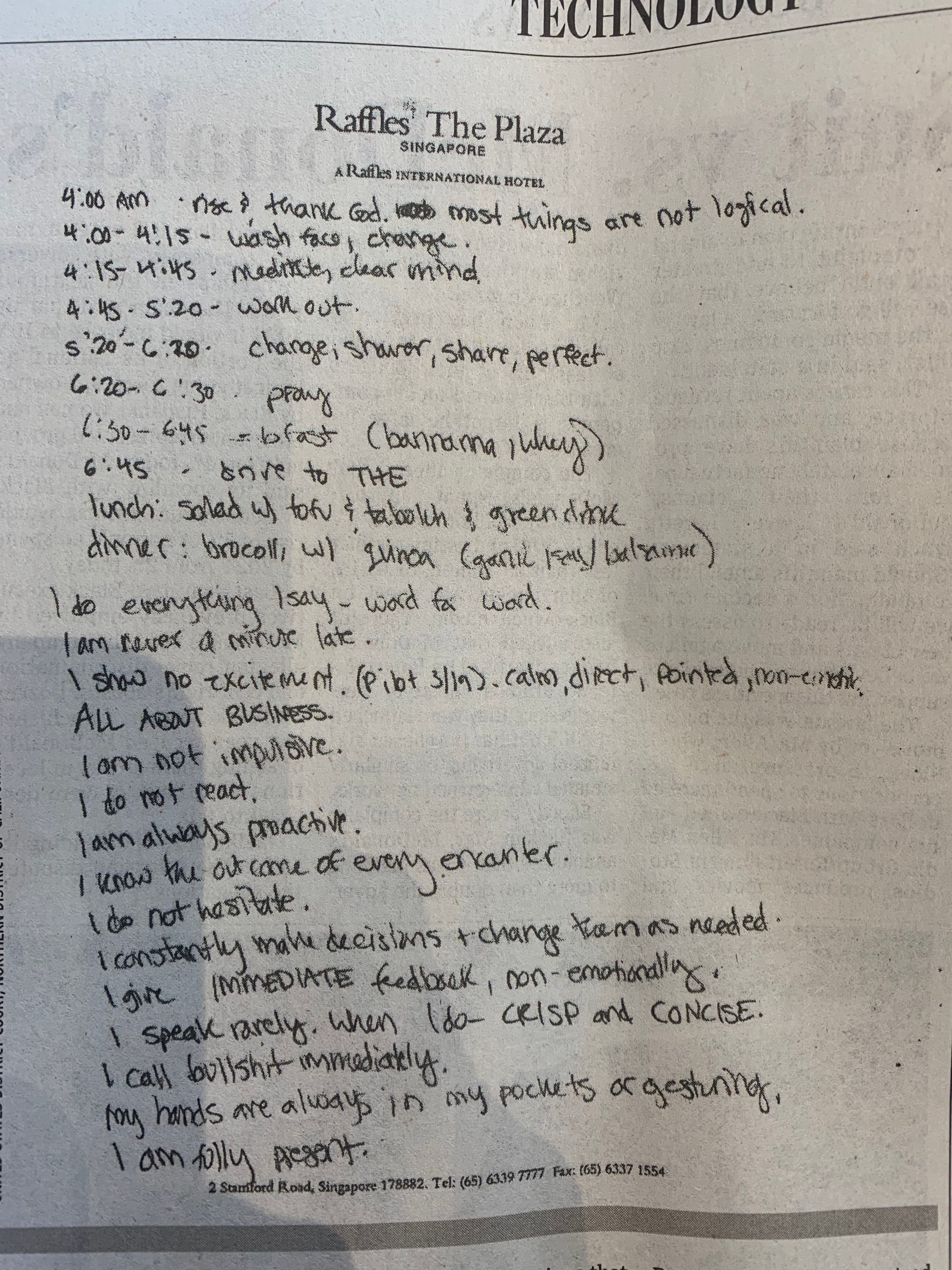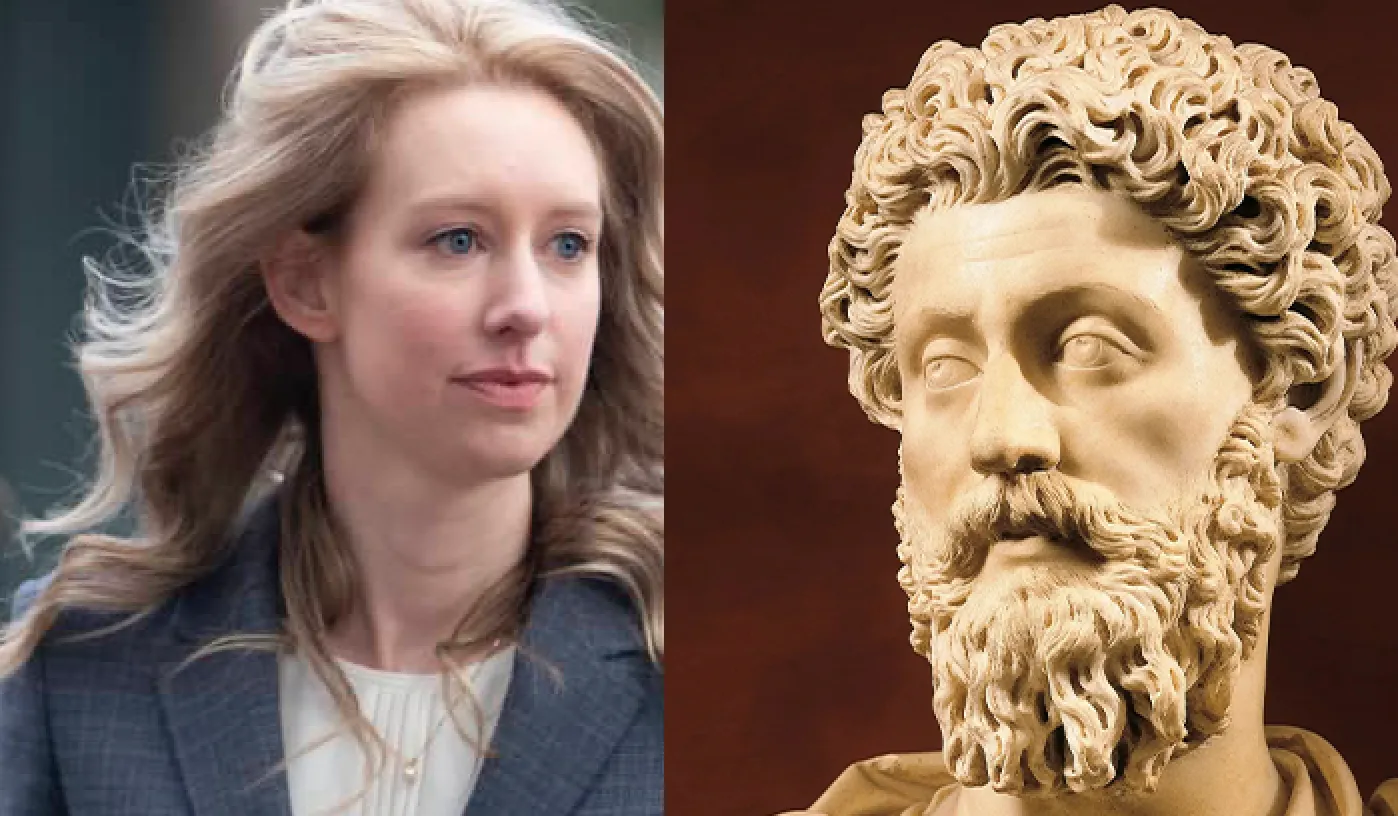An aphoristic note Elizabeth Holmes wrote to herself has been revealed
pursuant to her current fraud trial. Here it is:

It provides a portal into the minds of the technocratic elite: the drive towards blind progress, the stoic rejection of emotion, and a surprising devotion to an undefined God.
Holmes is accused of fraudulently manipulating investors, patients, pharma companies, drug store chains, public health institutions, and the press to boost her blood testing company Theranos to unicorn status. Her defense is that she was herself manipulated to do so by her abusive millionaire boyfriend, Sonny Balwani.
Balwani was her partner-in-crime (literally) at the helm of Theranos, and Holmes’ defense is almost certainly bullshit
. Not only because texts show an encouraging relationship between them, but also because of their shared mentality. A leaked memo of Sonny’s, purportedly written to Holmes, depicts a similar worldview
—one obsessed with superficial achievement via radical self-centeredness (“Every morning, I will force myself out of bed & spend 30 minutes+ (never a minute less) to write what I want from my day”) and focused elitism (“I will never meet with anyone (direct report especially) for more than 5 minutes unless I have written down why I am meeting with them”).
In my relatively substantial experience dealing with wannabe tech stars, this sort of sociopathic day-planning is common. If you have something they want, they ask you questions about what you want, eyes-ablaze, offering up email intros like gold, later memorializing you as a “file” in their little black books (“I will look at their file, their goals, their action items and set and control the agenda of that 5+ minute meeting.”) In my very limited experience dealing with actual tech stars, I haven’t found this to be true.
Holmes was herself was a devotee of perhaps the greatest note-to-self writer in history, Marcus Aurelius, whose Meditations is one of the great pop philosophy works of all time. Indeed, there is probably no work cited more often by the wantrenprenuer class than Meditations, and Holmes was no exception. Her love of Meditations was detailed in an effusive piece of Business Insider clickbait before Holmes’ fall from grace titled “11 timeless lessons from a book that changed billionaire CEO Elizabeth Holmes' life
.” She apparently read the book “over and over again,” and was inspired
by one of its key points—”live a life of purpose.”
Elizabeth Holmes will never be remembered as Marcus Aurelius, a philosopher-king whose work and life defined a philosophical paradigm (Stoicism) and guided the creators of Western Civilization. She’ll be remembered, if at all, as a way not to be. But perhaps by comparing the two we can understand more about why my generation of so-called leaders so grossly misunderstands the heroes they purport to follow, even when they’re talking to themselves. Why was Holmes “ALL ABOUT BUSINESS” when her greatest idol said specifically, “Do not be all about business?”
Elizabeth Holmes Says: 4:00am - Rise and thank God. most things are not logical.
Marcus Aurelius says: “When you wake up in the morning, tell yourself: The people I deal with today will be meddling, ungrateful, arrogant, dishonest, jealous, and surly. They are like this because they can't tell good from evil. But I have seen the beauty of good, and the ugliness of evil, and have recognized that the wrongdoer has a nature related to my own—not of the same blood or birth, but the same mind, and possessing a share of the divine.”
EH: 4:15 - 4:45 - meditate, clear mind
MA: “Soon you'll be ashes or bones. A mere name at most—and even that is just a sound, an echo.”
EH: 4:45 - 5:20 - work out.
MA: "It is a shame for a man to grow old without seeing the beauty and strength of which his body is capable."
EH: 6:20 - 6:30 - pray
MA: “All things are interwoven with one another; a sacred bond unites them; there is scarcely one thing that is isolated from another. Everything is coordinated, everything works together in giving form to one universe. The world-order is a unity made up of multiplicity: God is one, pervading all things; all being is one, all law is one (namely, the common reason which all thinking persons possess) and all truth is one -- if, as we believe, there can be but one path to perfection for beings that are alike in kind and reason.”
EH: lunch: salad w/ tofu & tabuleh & green drink
MA: “A cucumber is bitter. Throw it away. There are briars in the road. Turn aside from them. This is enough. Do not add, "And why were such things made in the world?"
EH: I do everything I say — word for word.
MA: “Does the light of a lamp shine and keep its glow until its fuel is spent? Why shouldn't your truth, justice, and self-control shine until you are extinguished?”
EH: I am never a minute late.
MA: “The best revenge is not to be like your enemy.”
EH: I show no excitement (Pilot 3/19 ). Calm direct, pointed, non-emotional.
MA: “Be like a rocky promontory against which the restless surf continually pounds; it stands fast while the churning sea is lulled to sleep at its feet. I hear you say, "How unlucky that this should happen to me!" Not at all! Say instead, "How lucky that I am not broken by what has happened and am not afraid of what is about to happen. The same blow might have struck anyone, but not many would have absorbed it without capitulation or complaint.”
EH: ALL ABOUT BUSINESS
MA: “In your actions, don't procrastinate. In your conversations, don't confuse. In your thoughts, don't wander. In your soul, don't be passive or aggressive. In your life, don't be all about business.”
EH: I am not impulsive.
MA: “Drama, combat, terror, numbness, and subservience--every day these things wipe out your sacred principles, whenever your mind entertains them uncritically or lets them slip in.”
EH: I do not react.
MA: “Enough of this miserable, whining life. Stop monkeying around! Why are you troubled? What’s new here? What’s so confounding? The one responsible? Take a good look. Or just the matter itself? Then look at that. There’s nothing else to look at. And as far as the gods go, by now you could try being more straightforward and kind. It’s the same, whether you’ve examined these things for a hundred years, or only three.”
EH: I am always proactive.
MA: Often injustice lies in what you aren't doing, not only in what you are doing.
EH: I know the outcome of every encounter.
MA: “When another blames you or hates you, or people voice similar criticisms, go to their souls, penetrate inside and see what sort of people they are. You will realize that there is no need to be racked with anxiety that they should hold any particular opinion about you.”
EH: I do not hesitate.
MA: Do not act as if thou wert going to live ten thousand years. Death hangs over thee. While thou livest, while it is in thy power, be good.
EH: I constantly make decisions + change them as needed.
MA: “[Before making a decision] The first thing to do--don't get worked up. For everything happens according to the nature of all things, and in a short time you'll be nobody and nowhere even as the great emperors Hadrian
and Augustus
are now. Get straight to doing what nature requires of you, and speak as you see most just and fitting--with kindness, modesty, and sincerity.”
EH: I give IMMEDIATE feedback, non-emotionally.
MA: “The impediment to action advances action. What stands in the way becomes the way.”
EH: I speak rarely. When I do—CRISP and CONCISE.
I call bullshit immediately.
MA: “If it is not right do not do it; if it is not true do not say it.”
EH: My hands are always in my pockets or gesturing.
MA:

EH: I am fully present.
MA: “Never let the future disturb you. You will meet it, if you have to, with the same weapons of reason which today arm you against the present.”
While Holmes may have been inspired to “live a life of purpose,” she apparently missed Marcus Aurelius’ purpose statement (despite her repeated readings): “The next thing to do--consider carefully the task at hand for what it is, while remembering that your purpose is to be a good human being.”
Instead, her purpose was to become a cautionary tale of what happens when you excise the strategic elements of Marcus Aurelius and leave the morality behind. Aurelius said, “The things we want in life are empty, stale, trivial…” and grounded his principles in service to the one God. God and principles existed to help Holmes satisfy her wants.
Perhaps, instead of broccoli with quinoa for dinner, she should have focused more on the parts of her note that found enjoyments beyond superficial desires and their fulfillment: the taste of the garlic, the soy sauce, the balsamic vinegar.
MA: “Dwell on the beauty of life. Watch the stars, and see yourself running with them.”
